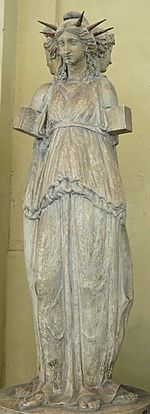Hecate
Hecate (Greek: Ἑκάτη, Hekátē) is the goddess of magic, crossroads, witchcraft, sorcery, ghosts and necromancy in ancient Greek religion and myth. The daughter of Perses and Asteria (twin sister of Leto), Hecate was a member of the third generation of Titans, but sided with Zeus and his siblings during the Titanomachy. As such, she was greatly honored by Zeus, who allowed her to operate on Earth, as well as the sky and the Underworld. A nocturnal figure, Hecate often dwelled in underground caves or in the Underworld itself. She was often invoked as a household deity, to provide aid in warding off evil spirits. Hecate assisted Demeter in her search for her daughter Persephone following Hades' abduction of her, guiding the goddess' path at night by her flaming torches. Afterwards, she frequently served as a companion of Persephone, joining her on her yearly journey to and from the realm of the dead. In later times, Hecate was depicted as a woman with three-heads, thought to represent the past, present and future. Serving as her attendants were the empousa, a species of man-eating monsters who were vampiric in appearance with a leg made of solid bronze and the other that of a donkey. Often identified with the goddesses Artemis and Selene, Hecate served as a representative of the harvest moon. Her symbols were a pair of torches, keys and daggers, and the serpent, polecat, and dog were considered her sacred animals. She was usually worshipped along side Demeter and Persephone. Her roman counterpart is Trivia.

References
change- The Goddess Hecate. Hecate's Cauldron Archived 2021-01-29 at the Wayback Machine, n.d. Web. 23 Oct. 2012.
- Hecate. Albany Archived 2013-05-09 at the Wayback Machine, n.d. Web. 13 Nov. 2012.
- "Hecate." Archived 2014-02-03 at the Wayback Machine. Greek Gods-Hecate. Alex Goldberger, n.d. Web. 6 Nov. 2012.
- "Hecate." Hecate.. Princeton University, n.d. Web. 6 Nov. 2012.
- Perses. Theoi, n.d. Web. 27 Nov. 2012.
- Ovid's Metamorphoses